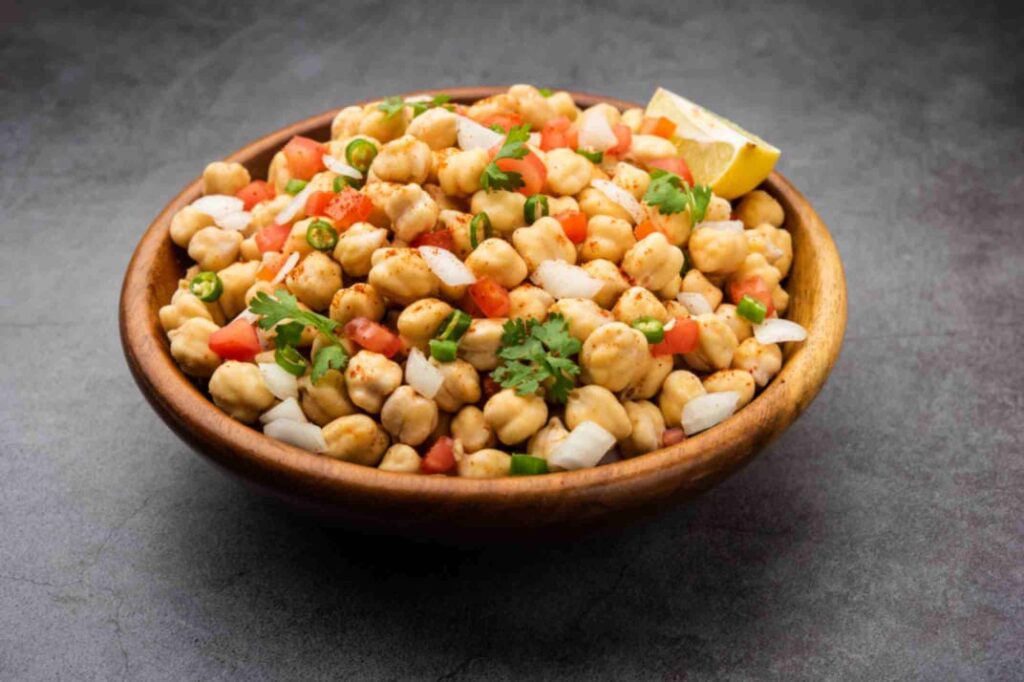Chickpeas, scientifically known as Cicer arietinum, are nutritious legumes that have been cultivated for thousands of years and are an integral part of many culinary traditions worldwide. These round, beige-colored legumes are appreciated not only for their versatility in cooking but also for their numerous health benefits. Chickpeas are an excellent source of plant-based protein, making them a popular choice for vegetarians and vegans. Additionally, they are rich in dietary fiber, vitamins, and minerals such as folate, iron, magnesium, and potassium. The high fiber content in chickpeas promotes digestive health and can help with weight management by providing a feeling of fullness. Chickpeas have also been linked to potential benefits for heart health and blood sugar control due to their low glycemic index and favorable nutrient profile. Commonly used in dishes like hummus, curries, soups, and salads, chickpeas offer a delightful nutty flavor and a satisfying texture that complements a wide range of cuisines. Whether enjoyed on their own or incorporated into various recipes, chickpeas are a wholesome and nutritious addition to any diet.
Nutritional Value
Chickpeas are nutrient-rich legumes that offer a wide range of vitamins, minerals, and other essential nutrients. Here is the nutritional value of chickpeas per 1-cup (164-gram) cooked serving:
- Calories: 269 calories
- Protein: 14.5 grams
- Dietary Fiber: 12.5 grams
- Carbohydrates: 45 grams
- Sugars: 8 grams
- Fat: 4.2 grams
- Saturated Fat: 0.4 grams
- Monounsaturated Fat: 0.8 grams
- Polyunsaturated Fat: 1.6 grams
- Vitamins:
- Folate (Vitamin B9): 282 micrograms (71% of the Daily Value)
- Thiamin (Vitamin B1): 0.2 milligrams (15% of the Daily Value)
- Vitamin B6: 0.2 milligrams (12% of the Daily Value)
- Riboflavin (Vitamin B2): 0.1 milligrams (9% of the Daily Value)
- Niacin (Vitamin B3): 1.1 milligrams (7% of the Daily Value)
- Pantothenic Acid (Vitamin B5): 1 milligram (6% of the Daily Value)
- Vitamin K: 6.2 micrograms (8% of the Daily Value)
- Vitamin E: 0.6 milligrams (3% of the Daily Value)
- Minerals:
- Iron: 4.7 milligrams (26% of the Daily Value)
- Magnesium: 48 milligrams (12% of the Daily Value)
- Phosphorus: 276 milligrams (11% of the Daily Value)
- Potassium: 291 milligrams (8% of the Daily Value)
- Zinc: 2.5 milligrams (17% of the Daily Value)
- Copper: 0.8 milligrams (36% of the Daily Value)
- Manganese: 1.7 milligrams (85% of the Daily Value)
- Selenium: 4.8 micrograms (7% of the Daily Value)
Chickpeas are particularly notable for their high content of folate, a B-vitamin important for cell division and tissue growth, and their substantial amount of dietary fiber, which aids in digestive health and helps manage blood sugar levels. They also provide essential minerals like iron for energy production, magnesium for muscle and nerve function, and manganese, which is a vital cofactor for various enzymes in the body.
Including chickpeas in your diet can contribute to overall nutritional well-being, especially if you’re looking to incorporate more plant-based protein and fiber into your meals. Additionally, they are a versatile ingredient that can be used in various savory and sweet dishes to enhance both flavor and nutrition.
Health Benefits
Chickpeas offer a range of health benefits due to their nutrient-rich composition and unique blend of vitamins, minerals, fiber, and phytonutrients. Here are some of the notable health benefits associated with chickpea consumption:
- Rich Source of Plant-Based Protein: Chickpeas are an excellent source of plant-based protein, making them a valuable addition to vegetarian and vegan diets. Protein is essential for tissue repair, muscle growth, and overall body function.
- Dietary Fiber for Digestive Health: Chickpeas are high in dietary fiber, which promotes healthy digestion by preventing constipation and supporting regular bowel movements. Fiber can also contribute to a feeling of fullness, aiding in weight management.
- Blood Sugar Control: The combination of fiber and protein in chickpeas can help stabilize blood sugar levels by slowing down the absorption of carbohydrates. This can be beneficial for individuals with diabetes or those at risk of developing the condition.
- Heart Health: Chickpeas may support heart health by helping to reduce cholesterol levels due to their soluble fiber content. Additionally, their low glycemic index can help regulate blood sugar and reduce the risk of heart disease.
- Weight Management: The fiber and protein in chickpeas promote satiety and may help control appetite, making them a valuable component of weight management and weight loss diets.
- Nutrient Density: Chickpeas are a nutrient-dense food, providing essential vitamins and minerals such as folate, iron, magnesium, and potassium. These nutrients are crucial for various bodily functions, including blood formation, muscle contraction, and maintaining healthy blood pressure.
- Bone Health: Chickpeas contain essential minerals like magnesium and phosphorus, which are important for bone health and density. These minerals, along with calcium, support strong and healthy bones.
- Antioxidant Properties: Chickpeas contain antioxidants, such as polyphenols and flavonoids, which help protect cells from oxidative damage and may reduce the risk of chronic diseases.
- Anti-Inflammatory Effects: Some components in chickpeas have been linked to anti-inflammatory properties, potentially reducing the risk of chronic inflammatory conditions.
- Support for Weight Loss and Satiety: Chickpeas’ fiber and protein content can contribute to feelings of fullness and satisfaction, which may help with weight management and reduce overall calorie consumption.
- Digestive Health: The fiber in chickpeas supports a healthy gut microbiome, which is essential for digestion and overall well-being.
- Versatility in Cooking: Chickpeas are versatile and can be used in various recipes, from soups and stews to salads and spreads like hummus, making it easier to incorporate them into a balanced diet.
Incorporating chickpeas into your diet can provide a range of health benefits and contribute to overall well-being. However, it’s important to consume them as part of a balanced diet that includes a variety of other nutrient-rich foods for a diverse and comprehensive nutritional profile.
Potential Side Effects: Are there any potential side effects or digestive discomfort associated with chickpea consumption, and how can they be mitigated?
Chickpeas are a generally well-tolerated and nutritious food for most people. However, like many foods, they may have some potential side effects or considerations, particularly when consumed in excessive amounts or by individuals with specific dietary needs or sensitivities. Here are some potential side effects and considerations related to chickpeas:
- Gas and Bloating: Chickpeas contain dietary fiber, particularly soluble fiber, which can cause gas and bloating in some individuals, especially if they are not accustomed to consuming high-fiber foods. Gradually increasing fiber intake and drinking plenty of water can help reduce these effects.
- Digestive Discomfort: Some people may experience digestive discomfort, such as abdominal cramps or diarrhea, when consuming large quantities of chickpeas. This is often related to individual tolerance levels and can vary from person to person.
- Phytic Acid: Chickpeas contain phytic acid, an antinutrient that can reduce the absorption of certain minerals like iron and zinc. Soaking, sprouting, or cooking chickpeas can help reduce the phytic acid content and improve mineral absorption.
- Allergic Reactions: While relatively uncommon, some individuals may have allergies to legumes, including chickpeas. Allergic reactions can range from mild symptoms like hives and itching to severe reactions, including anaphylaxis. Anyone with known legume allergies should avoid chickpeas and related products.
- Flatulence: The complex carbohydrates in chickpeas may lead to increased gas production in the digestive tract for some individuals. Proper cooking and soaking can help reduce this effect.
- Gout: Chickpeas are moderate in purines, which can be a concern for individuals with gout, a condition caused by the accumulation of uric acid in the joints. People with gout may need to limit their intake of purine-rich foods, including chickpeas.
- Oxalates: Chickpeas contain oxalates, which can contribute to the formation of kidney stones in susceptible individuals. Those with a history of kidney stones may need to moderate their intake of oxalate-containing foods, including chickpeas.
- Portion Size: Chickpeas are calorie-dense, and consuming them in excessive quantities can contribute to excessive calorie intake. This can be a concern for individuals trying to manage their weight.
It’s important to note that most of these side effects are relatively rare or manageable and may not affect everyone. In general, chickpeas are a nutritious and versatile food that can be part of a healthy diet when consumed in appropriate portions and as part of a balanced eating plan. If you have specific dietary concerns or sensitivities, it’s advisable to consult with a healthcare provider or registered dietitian for personalized guidance.
Allergenic Concerns: What are the allergenic concerns related to chickpeas, and how common are chickpea allergies?
Allergenic concerns related to chickpeas primarily revolve around the potential for individuals to develop allergies or sensitivities to legumes, including chickpeas. Here are some key points to consider regarding allergenic concerns:
- Legume Allergies: Chickpeas belong to the legume family, which also includes peanuts, lentils, soybeans, and other beans. Individuals who are allergic to one legume may be at an increased risk of developing allergies to other legumes, including chickpeas.
- Symptoms: Allergic reactions to chickpeas can vary from mild to severe and may include symptoms such as hives, itching, swelling of the lips or face, abdominal pain, vomiting, diarrhea, difficulty breathing, and anaphylaxis (a severe, life-threatening allergic reaction).
- Cross-Contamination: Cross-contamination is a concern, as chickpeas are often processed and handled in facilities that also process other legumes and allergenic foods. This means that even trace amounts of chickpea protein can potentially trigger an allergic reaction in sensitive individuals.
- Allergy Testing: If there is a suspicion of chickpea allergy, individuals should undergo allergy testing, which may include skin prick tests or blood tests to identify specific allergens.
- Hidden Chickpeas: Chickpeas can be present in various forms in foods, including as chickpea flour, chickpea pasta, and as an ingredient in various dishes, sauces, and spreads. It’s essential to read ingredient labels carefully and inquire about chickpeas when dining out if you have known chickpea allergies.
- Management: If you have known chickpea allergies or suspect an allergy, it’s crucial to avoid chickpeas and chickpea-containing products entirely. Management typically involves strict allergen avoidance and carrying an epinephrine auto-injector (EpiPen) in case of severe reactions.
- Consult an Allergist: If you suspect a chickpea allergy or have experienced allergic reactions after consuming chickpeas or chickpea-containing products, it’s important to consult an allergist for proper diagnosis, guidance on allergen avoidance, and personalized advice.
It’s worth noting that chickpea allergies are relatively less common than some other food allergies, such as peanut or shellfish allergies. However, for individuals with known allergies or sensitivities to legumes or a family history of food allergies, it’s essential to be vigilant, read food labels diligently, and communicate dietary restrictions to ensure safe food consumption.

Weight Management: Can chickpeas help with weight management and appetite control due to their fiber and protein content?
Yes, chickpeas can be beneficial for weight management and appetite control due to their rich content of both dietary fiber and protein. Here’s how these two components in chickpeas can contribute to a feeling of fullness and support weight-related goals:
- Dietary Fiber: Chickpeas are a notable source of dietary fiber, with about 12.5 grams of fiber per 1-cup cooked serving. Dietary fiber is essential for several reasons:
- Satiety: Fiber-rich foods tend to be more filling and can promote a sense of fullness and satisfaction after a meal. This can lead to reduced overall calorie intake, making it easier to control appetite and portion sizes.
- Digestive Health: Fiber aids in digestion and promotes regular bowel movements. A healthy digestive system can contribute to overall well-being and help prevent overeating.
- Blood Sugar Control: High-fiber foods like chickpeas can help stabilize blood sugar levels by slowing down the absorption of carbohydrates. This can reduce the likelihood of energy crashes and sugar cravings, which can lead to overeating.
- Protein Content: Chickpeas are a good source of plant-based protein, with approximately 14.5 grams of protein per 1-cup cooked serving. Protein is essential for several weight-related reasons:
- Satiety: Protein-rich foods are known to be more satiating than carbohydrate-rich foods. Including protein in your meals can help you feel full and satisfied, reducing the urge to snack between meals.
- Muscle Maintenance: Adequate protein intake is important for maintaining muscle mass, especially when pursuing weight loss. Preserving muscle can help maintain a higher metabolic rate, which can aid in long-term weight management.
- Thermic Effect: Protein has a higher thermic effect compared to carbohydrates and fats, meaning it requires more energy to digest. This can slightly increase calorie expenditure.
Incorporating chickpeas into your meals can be a valuable strategy for supporting weight management and appetite control. Whether added to salads, soups, stews, or used to make dishes like hummus or roasted chickpea snacks, chickpeas provide a satisfying combination of fiber and protein that can help you feel fuller for longer and ultimately make it easier to maintain a balanced and calorie-conscious diet. However, it’s important to be mindful of portion sizes and the overall calorie content of your meals to achieve your specific weight-related goals.

Serving Sizes: What is an appropriate portion size of chickpeas for a balanced diet, and how often should they be included in meals?
An appropriate portion size of chickpeas for a balanced diet typically falls within the range of 1/2 to 3/4 cup (approximately 80-120 grams) per meal. Chickpeas can be included in meals as often as desired, and many people incorporate them into various dishes several times a week. These versatile legumes offer an excellent combination of plant-based protein, dietary fiber, vitamins, and minerals. They not only provide valuable nutrients but also contribute to a sense of fullness and satisfaction, making them a valuable asset for weight management and appetite control. However, it’s important to be mindful of individual calorie needs and dietary goals when determining portion sizes, ensuring they align with overall health and nutritional objectives. Variety in meal planning remains essential, and chickpeas can be enjoyed in a diverse range of recipes, from salads and stews to hummus and snacks, enriching your diet with both flavor and nutrition.














